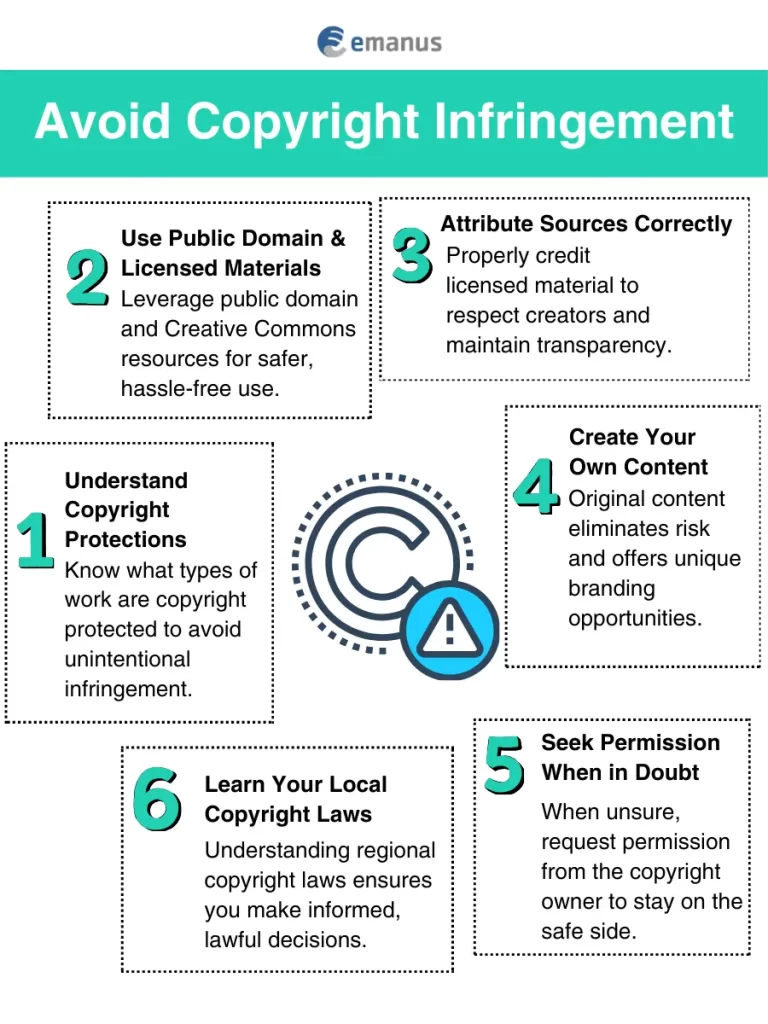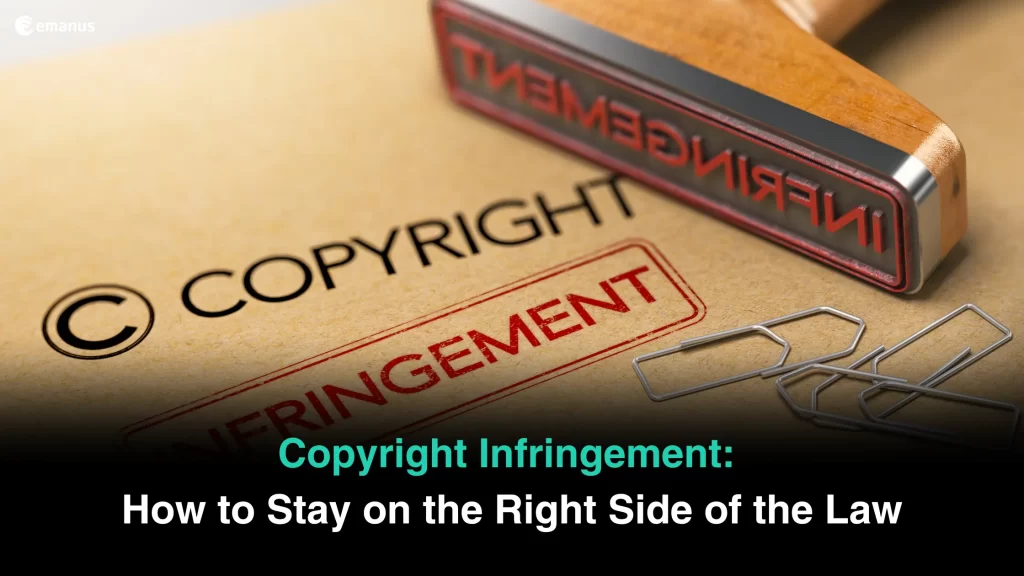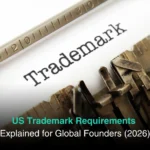In today’s digital world, creativity is everywhere—whether it’s in content, music, art, or software. However, with the ease of access to creative materials, there also comes a risk of copyright infringement.
This blog breaks down what copyright infringement is, the copyright infringement penalties, and, most importantly, how to avoid copyright infringement in your own work.
What Is Copyright Infringement?
At its core, copyright infringement is the unauthorized use or reproduction of someone else’s copyrighted material. Copyright laws grant creators exclusive rights to their works, such as books, films, music, and even website content.
If someone uses these protected materials without permission, they’re infringing on the copyright holder’s rights.
To illustrate, imagine you’re creating a promotional video for your business and decide to use a popular song as the background music. If you don’t have permission from the song’s copyright holder, that’s considered infringement of copyright.
The copyright holder has exclusive rights to decide who can reproduce, distribute, or publicly perform the song. This is why it’s so crucial to understand what constitutes copyright infringement and how you can prevent it.
Why Is Copyright Infringement a Big Deal?
To better understand the importance of copyright protection, it’s crucial to recognize the impact copyright infringement has on creators.
Copyright infringement doesn’t just impact the original creator’s rights; it can lead to significant financial and legal consequences. From a financial standpoint, creators lose potential revenue when their work is unlawfully copied, distributed, or used without permission.
Infringement can also harm their reputation, especially if the copied work is misused or altered in a way that they wouldn’t approve of.
Copyright Infringement Penalties: The Legal Consequences
The legal consequences of copyright infringement vary depending on the nature and severity of the infringement. Commonly, these penalties fall under two categories: civil and criminal.
1. Civil Penalties:
In many cases, copyright holders can sue for damages. If the court finds you guilty of infringement, you could be required to pay actual damages or statutory damages.
These penalties often range from $750 to $30,000 per work. However, if the court determines that the infringement was intentional, this amount can escalate up to $150,000 per work.
2. Criminal Penalties:
For more severe cases, such as willful or repeated infringement, criminal charges can be filed. This can lead to fines up to $250,000 and even prison sentences of up to five years.
Criminal penalties are often applied in cases of mass piracy, like illegally distributing software or streaming media content.
Aside from these financial and legal penalties, businesses found guilty of copyright infringement may suffer from a damaged reputation, as legal battles and fines become public knowledge. This can ultimately impact customer trust and long-term success.
How to Avoid Copyright Infringement: Key Strategies

Now that we understand the penalties of copyright infringement, let’s dive into some practical steps on how to avoid copyright infringement and protect both your business and your personal projects.
1. Understand What Is Protected by Copyright
One of the simplest ways to prevent copyright infringement is to understand what types of work are protected by copyright. Generally, any original piece of literature, music, film, photography, and even certain types of design are protected by copyright law.
If you didn’t create it, or if it doesn’t explicitly state that it’s in the public domain, assume it’s copyrighted.
2. Use Public Domain and Creative Commons Materials
A great way to avoid the risk of infringing on someone’s copyright is to utilize public domain resources. Works in the public domain are not protected by copyright and can be freely used by anyone.
Additionally, Creative Commons licenses provide flexibility; they allow creators to grant certain permissions for use while still retaining some rights. This makes it easier to know when you’re within your rights to use a particular image, video, or piece of music.
3. Always Seek Permission
If you find material that you’d like to use but are unsure of its copyright status, the safest option is to seek permission from the copyright owner. In many cases, creators may grant permission for a small fee or free of charge, depending on the intended use.
Documenting this permission can also serve as legal protection if any disputes arise in the future.
4. Create Your Own Content
Perhaps the most straightforward solution to avoiding copyright issues is to create your own content. By using your own photos, videos, music, and text, you have complete control over your work. Not only does this eliminate any legal risk of infringement, but it also provides unique content that can set your business apart. If content creation isn’t your area of expertise, consider hiring professionals to develop original assets for your projects.
5. Familiarize Yourself with Copyright Laws
Understanding fair use and copyright laws specific to your region can help you make informed decisions. For example, the U.S. Copyright Act provides clear guidelines on what qualifies as fair use, such as certain educational and critical uses of copyrighted material.
By being aware of these laws, you can avoid accidental infringement and better protect your work.
6. Properly Attribute Sources
For cases where you are allowed to use copyrighted material under Creative Commons or similar licensing, make sure to provide proper attribution. Even if you have permission, giving credit to the original creator shows respect for their work and maintains transparency with your audience.
What to Do If You Suspect Copyright Infringement
If you suspect someone has used your copyrighted work without permission, you have several options for action. First, you can issue a ‘cease-and-desist letter’, a formal notice asking the infringing party to stop using your work. This often resolves the situation without the need for a lawsuit.
In cases where a cease-and-desist letter doesn’t yield results, you can pursue a copyright infringement lawsuit. Through legal proceedings, you can seek monetary damages for the unauthorized use of your work.
Final Thoughts: Protect Yourself and Others’ Work
Copyright infringement is a serious matter with significant legal consequences, especially in an era when content is constantly shared and reposted. By understanding how to avoid copyright infringement through proper practices—such as using your own content, obtaining permissions, and following copyright laws—you can safeguard your business or personal projects from potential legal trouble. Respecting copyright is not only about following the law; it’s about honoring the creativity and hard work of others.
Key FAQs on Copyright Infringement and How to Avoid It Effectively
1. How Can You Avoid Copyright Infringement?
The best ways to avoid copyright infringement include creating your own content, using public domain materials, and obtaining permission when using copyrighted works.
Always check the terms of use when using resources online, as copyright protections apply even on the internet.
2. What Are the Legal Consequences of Copyright Infringement?
Copyright infringement penalties range from civil fines to criminal charges. You may face damages up to $150,000 for each work infringed upon, and severe cases can lead to jail time.
3. Is It Enough to Credit the Original Creator?
Simply crediting the creator doesn’t protect you from copyright infringement if you’re using a copyrighted work without permission. Proper attribution is required for specific licenses, like Creative Commons, but does not replace the need for permission.
4. Are All Online Images Copyrighted?
Yes, most online images are copyrighted. Some may be free to use under specific licenses, but it’s essential to check for copyright status and usage rights.






